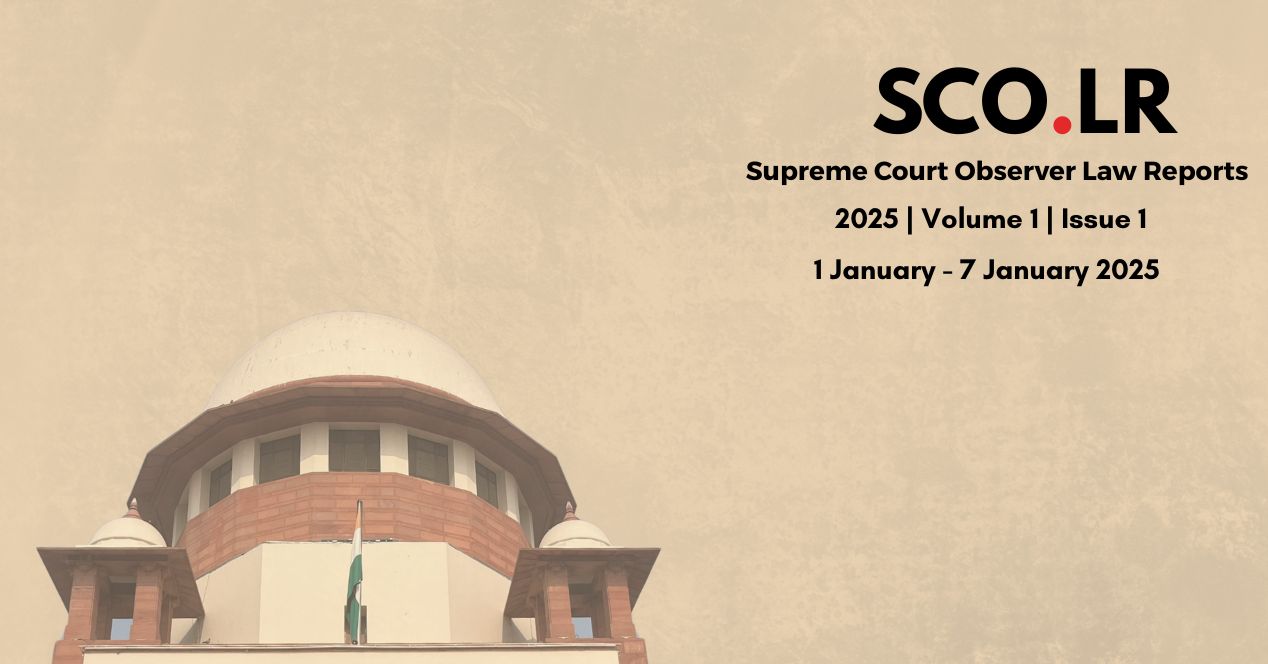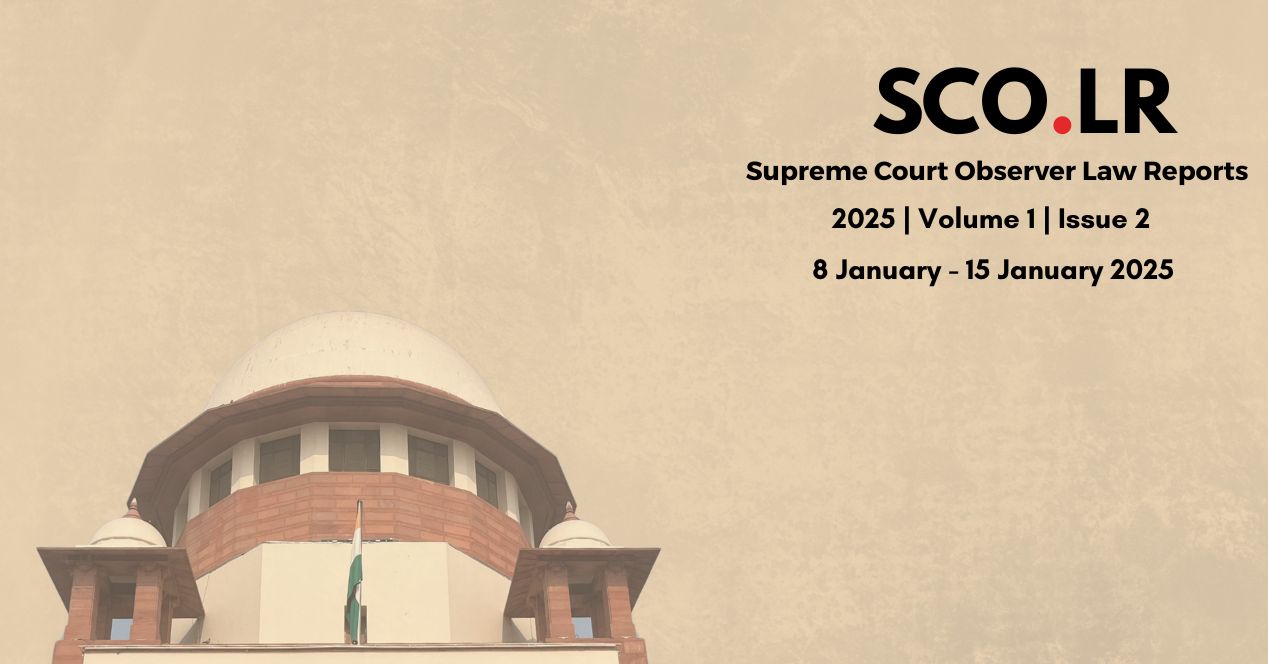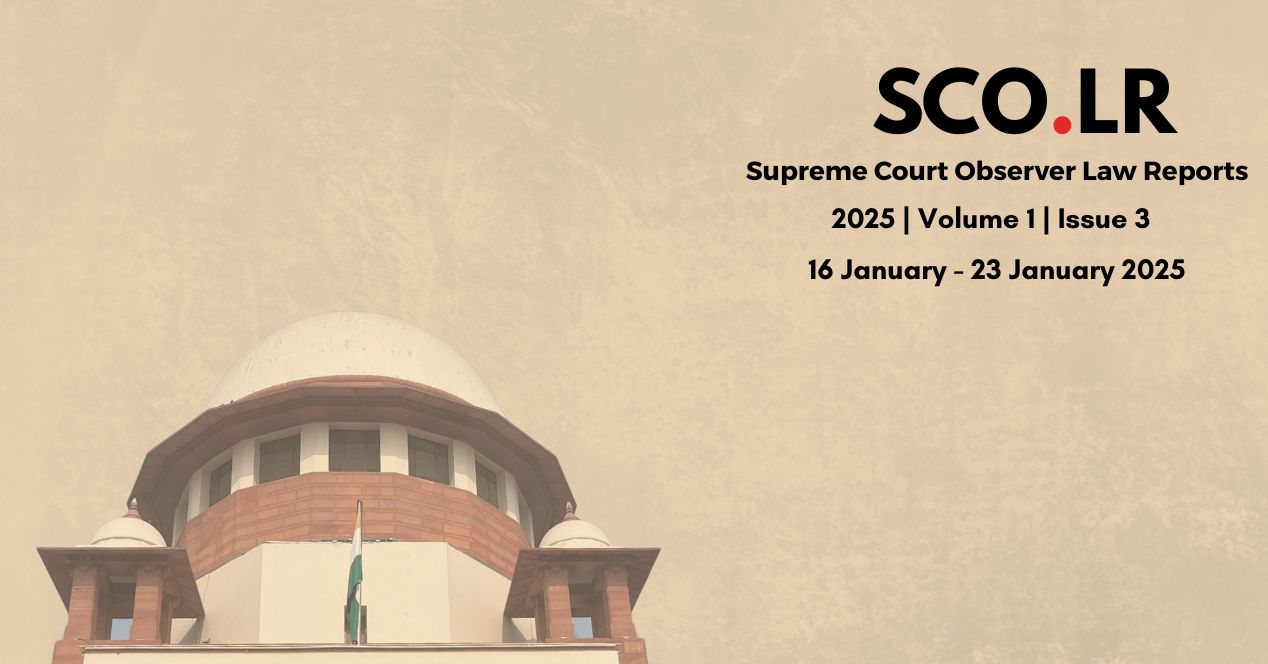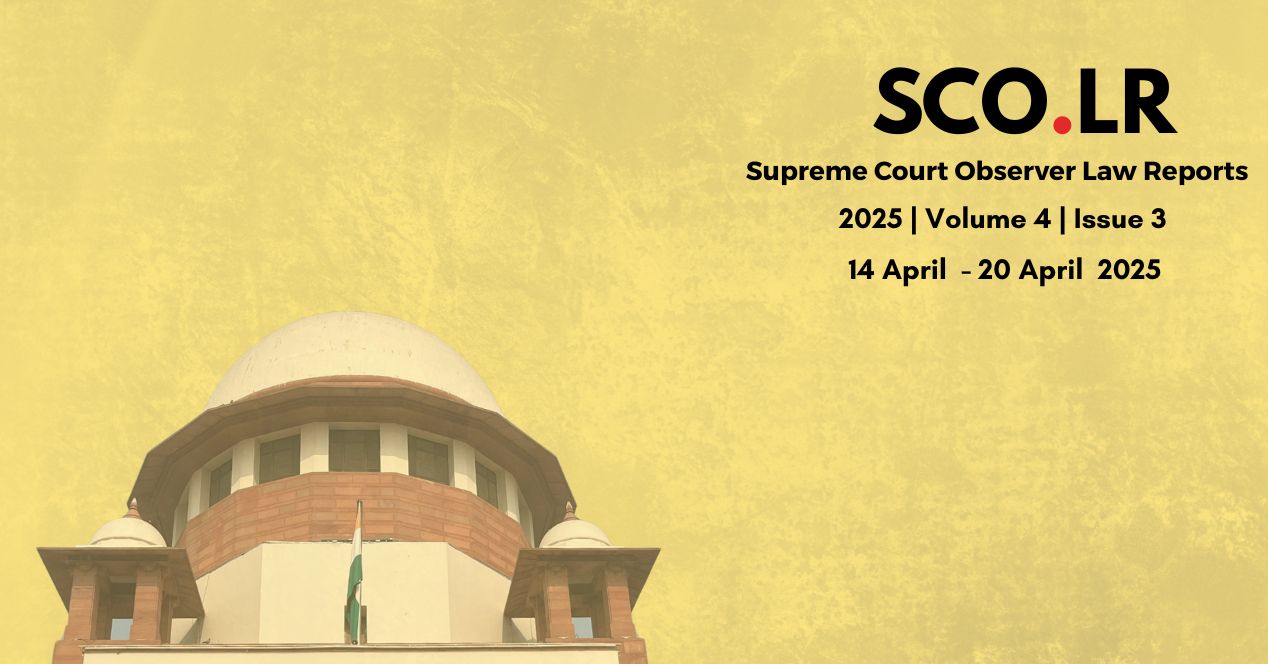Analysis
SCO.LR | 2025 | Volume 1 | Issue 4
In this edition of SCO.LR, we summarise five significant and unmissable judgements from 24 January to 31 January 2025
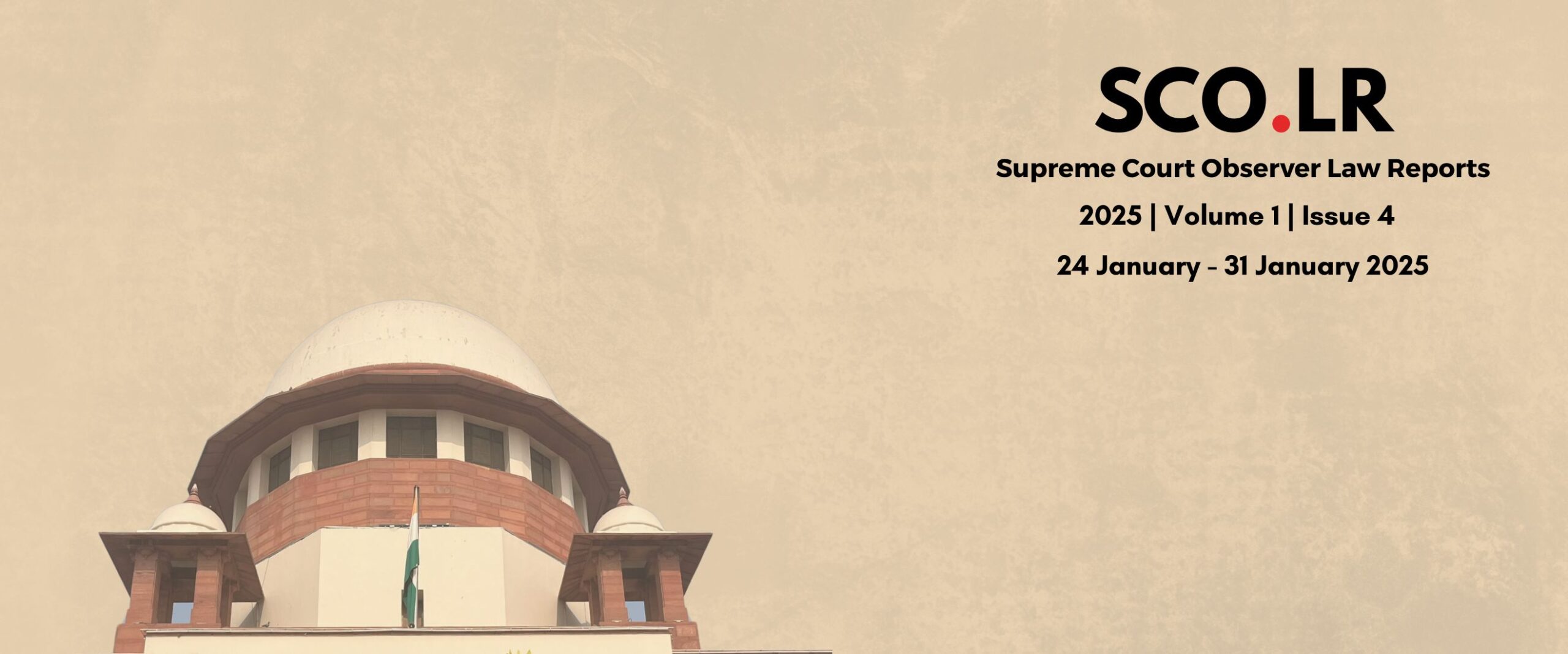
Here’s Volume 1 Issue 4 of the Supreme Court Observer Law Reports (SCO.LR). This issue covers the week from January 24 to 31.
Let us know what you’ve liked about SCO.LR and how we can make it more useful for your legal research. Write to us at admin@scobserver.in.
**********
The Supreme Court Observer Law Reports
2025 SCO.LR | Vol 1 | Issue 4
24 January – 31 January 2025
**********
“Filthy Language” Does Not Amount to Outraging Modesty
Madhushree Datta v State of Karnataka
24 January 2025
Citation: 2025 INSC 105 | 2025 SCO.LR 1(4)[16]
Bench: Justices Dipankar Datta and P.K. Mishra
The Supreme Court held that the use of “filthy language” does not amount to the breach of peace (Section 504) and outraging of modesty (Section 509) under the Indian Penal Code, 1860.
The complainant alleged that her employment was forcefully terminated and her colleagues reprimanded her using “filthy language”. She claimed that she was being harassed by her superiors. The Karnataka High Court refused the accused persons’ plea to quash proceedings.
The Supreme Court set aside the High Court’s order. It held that “filthy language” in isolation and without context does not indicate intent to outrage the modesty of a woman. They noted that proof of the use of “filthy language” and the ingredients needed to charge the company’s employees were missing in the complaint.
Key words/phrases: High Court order quashed—filthy language is not outraging of modesty—Section 509 of Indian Penal Code—illegal termination of employment—civil dispute—not criminal intimidation
Read the Judgement here.
**********
Court’s Limited Scope under Section 37 of the Arbitration Act
Somdatt Builders NCC-NEC v National Highways Authority of India
27 January 2025
Citations: 2025 INSC 113 | 2025 SCO.LR 1(4)[17]
Bench: Justices A.S. Oka and Ujjal Bhuyan
The Supreme Court held that courts must not interpret contractual terms while hearing an appeal concerning the setting aside of an arbitral award.
The NHAI and Somdutta Construction entered into a contract for the upkeep and construction of roads. Somdutta used more geogrid than initially set out in the Bill of Quantities. An external engineer decided that NHAI is liable only to pay the pre-approved costs. Somdutta approached the Dispute Review Board (DRB) seeking complete payment, citing that the NHAI had set the scope of work incorrectly. The DRB ordered complete payment, and this decision was upheld by a single judge of the Delhi High Court. A Division Bench set this award aside under Section 37 of the Arbitration Act, 1996, based on its interpretation of the construction contract.
The Supreme Court set aside the Division Bench decision and held that a Court cannot consider the merits of the case while hearing a Section 37 appeal, as its scope is limited.
Key words/phrases: High Court order set aside—Section 37 of the Arbitration Act—appeal against Section 34 order—limited scope of the Court—Court cannot reopen merits of the case—Court cannot interpret contractual clauses
Read the Judgement here.
**********
Child considered legitimate if conceived while husband and wife had “access”
Ivan Rathinam v Milan Joseph
28 January 2025
Citation: 2025 INSC 115 | 2025 SCO.LR 1(4)[18]
Bench: Justices Surya Kant and Ujjal Bhuyan
The Supreme Court held that a child born during a valid marriage shall be presumed legitimate unless proven that the mother and father did not have access to each other.
Milan Joseph was born while his mother and Raju Kurian were married. After divorce, Joseph’s mother claimed that Ivan Rathinam was the biological father and sought maintenance from him. A Munsiff Court directed a paternity test before granting maintenance. The Kerala High Court directed the Munsiff Court to reconsider, as Section 112 of the Indian Evidence Act, 1872 required the presumption of legitimacy when husband and wife have access to each other. The case was then dismissed by the Munsiff Court. Rathinam appealed against the initiation of a fresh maintenance case before a family court. The High Court held that legitimacy of the child under Section 112 does not prevent an enquiry into the paternity of a child.
The Supreme Court held that legitimacy is “entombed” within paternity. Adultery does not necessarily mean non-access, and does not displace the presumption under Section 112. It overturned the High Court’s order, stating that there was no proof that husband and wife were separated when Joseph was conceived.
Key words/phrases: Kerala High Court Order quashed—Child considered legitimate under Section 112 of Indian Evidence Act, 1982—adultery not sufficient ground to rebut legitimacy—paternity test valid if non-access of married partners proved
Read the Judgement here.
**********
Residence-based Reservation in Postgraduate Medical Courses Unconstitutional
Dr. Tanvi Behl v Shreya Goel
29 January 2025
Citations: 2015 INSC 125 | 2025 SCO.LR 1(4) [19]
Bench: Justices Hrishikesh Roy, Sudhanshu Dhulia and S.V. Bhatti
The Supreme Court held residence-based reservations to postgraduate medical courses to be unconstitutional.
The Government Medical College and Hospital, Chandigarh had 64 seats under the state quota. The college distributed all quota seats on “institutional preference” to its undergraduate and to candidates who resided in Chandigarh. The Punjab and Haryana High Court found the reservation to be violative of Article 14. It directed that admissions be based on the NEET merit list.
The Supreme Court held that residence-based reservations in UG medical courses were permitted but not in PG courses. Any residence-based reservation must be based on a reasonable classification under Article 14.
Keywords/phrases: Punjab and Haryana High Court decision upheld—residence-based reservation—impermissible—postgraduate medical course—reasonable classification—Article 14
Read the Judgement here.
**********
Employment may not be terminated during the pendency of labour dispute
Shripal v Nagar Nigam, Ghaziabad
31 January 2025
Citation: 2025 INSC 144 | 2025 SCO.LR 1(4)[20]
Bench: Justices Vikram Nath and P.B. Varale
The Supreme Court held that termination of employment during the pendency of a labour dispute violates basic labour law principles.
The petitioners worked at the Ghaziabad Municipal Corporation without employment contracts. They alleged that they were denied wages, leaves and statutory benefits. They were laid off—orally and without notice—when they raised an industrial dispute before the Conciliation Officer. The Labour Court found the termination unlawful for some employees and ordered reinstatement with 30 percent back wages. It dismissed the case against the others on the grounds that they were appointed through a contractor. The Allahabad High Court upheld both orders and directed that the workmen be rehired on daily wages, with regularisation to be revisited later.
The Supreme Court held that the Municipal Corporation tried to circumvent the conciliation process by terminating employees, amounting to an unfair labour practice. It quashed the relief granted by the High Court and ordered full reinstatement, back wages and regularisation.
Read the Judgement here.
Key phrases/words: High Court Order quashed—Labour dispute—Section 6E UP Industrial Dispute Act—Section 6N—Uncertainty of employment—right to remuneration—regularisation of employment— termination during conciliation—labour right upheld
**********
This Issue of SCO.LR is put together by Ajitesh Singh, Advay Vora, Gauri Kashyap and R. Sai Spandana

